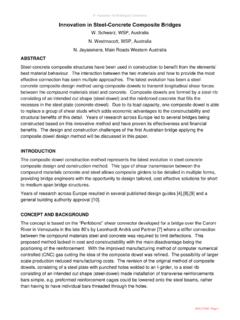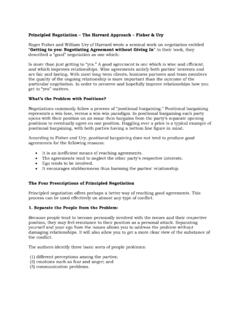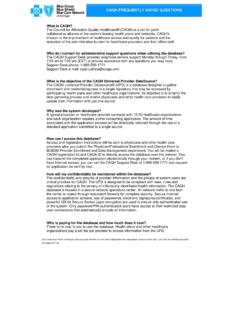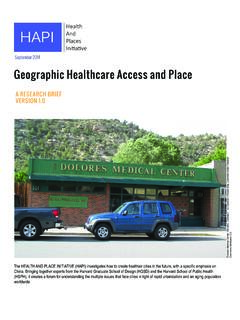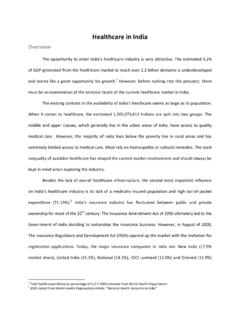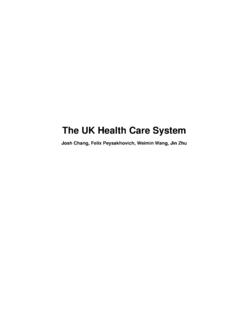Transcription of Healthcare in the Netherlands - etouches
1 Healthcare in the NetherlandsMinistry of Public Health, Welfare and SportHealthcare in the Netherlands | 1 Content Introduction 3 Health Insurance Act 7 Public and private Basic health insurance package quality Securing Healthcare Funding of Healthcare under the Health Insurance Act Supervision Long-Term Care Act 13 Solidarity quality Care under the Long-Term Care Act access to Healthcare Funding Healthcare under the Long-Term Care Act Supervision Social Support Act 19 Municipal approach: personalised care and inclusion Support under the Social Support Act Securing support quality Funding support under the Social Support Act Youth Act 21 Support, assistance and care under the Youth Act Municipal approach Securing support quality Financing youth servicesMinistry of Public Health, Welfare and Sport2 | Healthcare in the NetherlandsMinistry of Public Health, Welfare and SportHealthcare in the Netherlands | 3 IntroductionThe Dutch Healthcare SystemThe philosophy underpinning the Dutch Healthcare system is based on several more or less universal principles: access to care for all, solidarity through medical insurance (which is compulsory for all and available to all) and high- quality Healthcare services.
2 Inevitably, the Dutch system has also been shaped by a number of historical trends and developments and social of the Healthcare systemThe Dutch Healthcare system is governed by four basic Healthcare -related acts: the Health Insurance Act (Zorgverzekeringswet), the Long-Term Care Act (Wet langdurige zorg), the Social Support Act (Wet maatschappelijke ondersteuning) and the Youth Act (Jeugdwet). In addition, there are several general laws in place (including the Competition Act/Mededingingswet) and a number of specific Healthcare acts ( the Care Institutions ( quality ) Act).The four Healthcare -related acts form the foundation of the Dutch Healthcare system. The Health Insurance Act (which provides for hospital care) and the Long-Term Care Act (which focuses on other types of care) account for the bulk of the Healthcare budget available in the Netherlands .
3 The Long-Term Care Act is a national act governing Healthcare throughout the Netherlands . In implementing the Health Insurance Act, private health insurance companies play a key role in a system based on regulated competition and a number of specific public requirements. The Social Support Act and the Youth Act provide for other forms of care and support. The roughly 400 municipalities in the Netherlands are primarily responsible for enforcing these two of the Dutch Healthcare SystemThe current Dutch Healthcare system can best be explained by looking at a number of recent changes. In 2006 the new Health Insurance Act entered into force, under which all residents of the Netherlands are entitled to a comprehensive basic health insurance package. This act is implemented by private, competitive health insurers and Healthcare providers.
4 It should be noted that virtually all health insurance companies in the Netherlands are not-for-profit cooperatives that allocate any profits they make to the reserves they are required to maintain or return them in the form of lower premiums. There are a total of 24 insurers in the Netherlands which bear a risk for their of Public Health, Welfare and Sport4 | Healthcare in the NetherlandsThe Health Insurance Act has transformed the Dutch Healthcare system from a supply-driven to a demand-driven system. Private health insurance companies are improving the Healthcare system in a number of ways: shorter waiting lists and less red tape in conjunction with a greater focus on effectiveness and quality , in the interest of patients and policyholders. A process of selective contracting enables health insurance companies to control the effectiveness and quality of the care provided by Healthcare providers.
5 Members of the public, in turn, also have some degree of control over this process, since they are given the opportunity every year to switch Healthcare providers and can influence the policies of health insurers and health institutions. While the Healthcare system is essentially a private system, the government plays a controlling role in order to protect the public interest. Long-term care, youth health services and social supportThe Long-Term Care Act, the Social Support Act and the Youth Act were introduced more recently, having entered into force in their present form in 2015. The Long-Term Care Act is administered by special long-term care administrators at the behest of the central government. Additionally, several other organisations are involved in its implementation, such as the Centraal Indicatiestelling Zorg (Care Assessment Agency) and the Centraal AdministratieKantoor (Central Administration Office).
6 The local authorities are responsible for implementing the Social Support Act and the Youth Act they provide the support, assistance or care services or are supported in this process by a Healthcare motivations behind these laws are opportunities to improve the quality of the care provided, promote an integrated approach, and keep Healthcare available and affordable in times of an ageing population and in which many people suffer from chronic illnesses. The foundation of these domains are people s opportunities rather than their shortcomings. Initially, people are encouraged to draw on their own network and resources for support, but support is always available for those unable to secure it themselves. Those requiring permanent supervision or 24-hour home care are entitled to care services under the Long-Term Care Healthcare system was recently overhauled in order to facilitate the enactment of the three new acts.
7 As a first step in this process, the General Exceptional Medical Expenses Act was repealed. This act had come to cover a wide variety of care and support services over the years, as a result of which the system of long-term care was at risk of becoming unmanageable. A portion of the people taking advantage of the provisions under this act are currently covered under the Health Insurance Act, the Social Support Act or the Youth Act. Since 2015, all long-term care is provided under the Long-Term Care Act, which is strictly intended for the most vulnerable categories of of Public Health, Welfare and SportHealthcare in the Netherlands | 5 Secondly, the local authorities are responsible for administering and implementing the Social Support Act and the Youth Act. Many people who were previously covered under the General Exceptional Medical Expenses Act can turn to the local government for lighter forms of care and support.
8 The idea behind this change is that local authorities are closer to the people and are therefore able to provide effective, high- quality care. The four acts in practicePrivate individuals may be affected by the four Healthcare -related acts in the ways described below. For example, when someone needs to see their general practitioner (GP) or is hospitalised, this is paid out of the compulsory basic health insurance package under the Health Insurance Act. Those who require permanent supervision or 24-hour home care can take advantage of provisions under the Long-Term Care Act. The Social Support Act and the Youth Act provide for other forms of support, assistance and care. For example, those who require home assistance or a wheelchair due to a disorder can apply for this care to the local authority.
9 The latter can then arrange for support under the Social Support Act. If there are families that require parenting support, for example, or if an autistic child requires support in everyday living, the local authority can provide this under the Youth are just several examples of the health and support services provided under the four Healthcare -related acts. The four acts are roughly outlined in the next four chapters of this publication. In these sections, we review the various parties involved, the types of care and support provided under the law, the quality of the care services provided, funding, and supervision. Healthcare in the NetherlandsPopulation Approx. 17 millionGross Domestic Product (GDP)Approx. EUR 700 billionHealthcare expenditureApprox. 10% of GDPT otal number of people employed in the Healthcare fieldRoughly 1,1 millionHealthcare expenditure in EURA pprox.
10 EUR 70 billionMinistry of Public Health, Welfare and Sport6 | Healthcare in the NetherlandsMinistry of Public Health, Welfare and SportHealthcare in the Netherlands | 7 Health Insurance ActCurative medicine in the Netherlands is provided for under a single Health Insurance Act, which replaced a number of separate public and private health insurance types in 2006. Roughly 60% of the total Healthcare budget is allocated towards services provided under the Health Insurance and privateThe Dutch health insurance system combines elements of public and private insurance. The central government is directly involved in implementing the Health Insurance Act and sets a number of public requirements which guarantee the social nature of the health insurance: private individuals are required to purchase basic health insurance and are free to choose their own insurer; health insurers are required to accept these private individuals under their policy, irrespective of their health condition; the premiums for a policy offered are equal for all policyholders, regardless of their health condition, age or background; health insurers have a duty of care: they must guarantee that Healthcare is available in the basic package for all their policyholders.



